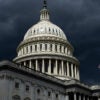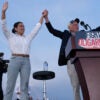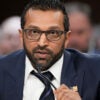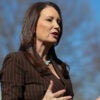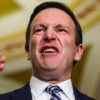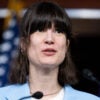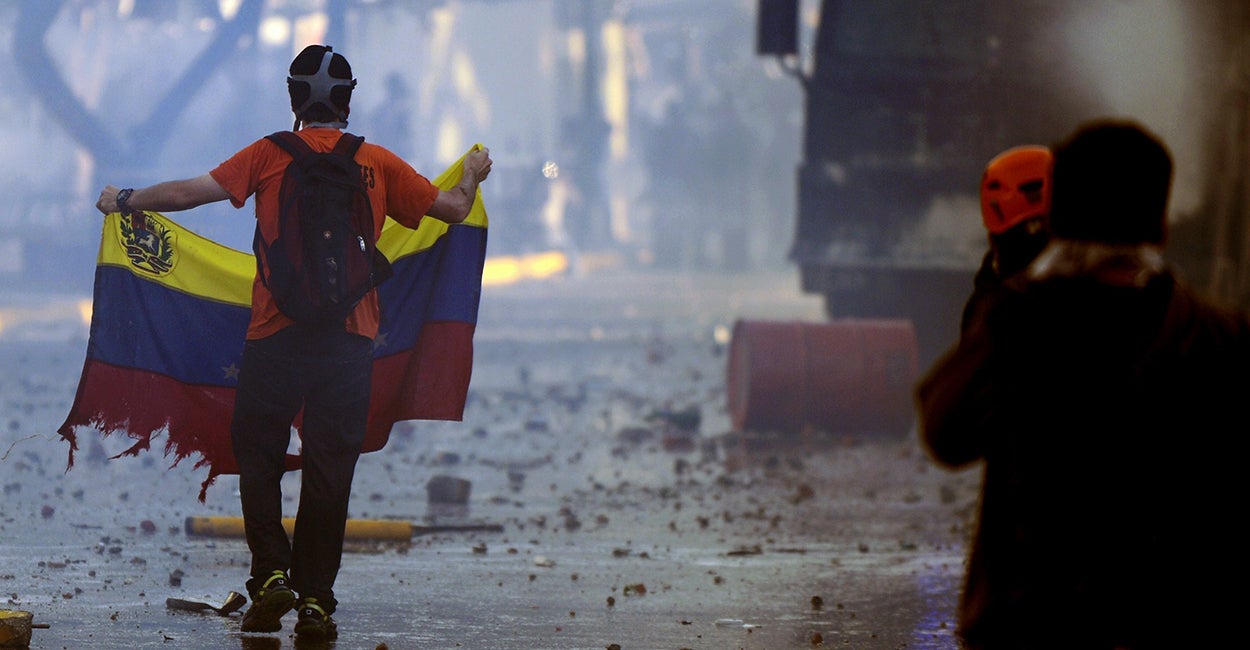Two decades ago, Venezuela was a thriving country. Today, Venezuela is ranked 176th on The Heritage Foundation’s Index of Economic Freedom, just above North Korea.
How did Venezuela fall from prosperity so quickly? How did socialist policies affect the nation’s economy? Is there any hope for its future?
Jorge Galicia, a refugee from Venezuela and outreach fellow at The Fund for American Studies, joins “The Daily Signal Podcast” to answer these questions and describe what it was like to grow up in Venezuela.
The Daily Signal depends on the support of readers like you. Donate now
Also on today’s show, we cover these stories:
- Ukrainian President Volodymyr Zelenskyy calls on the United Nations to remove Russia from its Security Council.
- Twitter offers entrepreneur Elon Musk a seat on its board of directors after he becomes the social media company’s largest shareholder.
- Individuals who live in Palm Springs, California, and identify as transgender or nonbinary are eligible to receive up to $900 a month.
Listen to the podcast below or read the lightly edited transcript.
Virginia Allen: Two decades ago, Venezuela was a thriving country. Today, Freedom House ranks it not free and The Heritage Foundation’s Index of Economic Freedom ranks it 176, coming in just above North Korea. The question is, what happened in Venezuela? How did it get to this point? Well, here with us today to answer that question is a Venezuelan refugee and an outreach fellow at The Fund for American Studies, Jorge Galicia.
Jorge, thank you so much for being here.
Jorge Galicia: No, thank you, Virginia. Thank you for the invitation, it’s an honor.
Allen: I would love to begin by just asking you to share a little bit of your own background. You actually grew up in Venezuela. What do you remember from living there? What was your childhood like in Venezuela?
Galicia: Yeah, that’s a good question. I only arrived here to the [United] States like three years ago. So almost my entire life, I spent it there in Venezuela. I experienced the whole transition.
When I was a child, my childhood in Venezuela was pretty normal, pretty happy, to be honest. I grew up having the latest versions of my favorite video games, good birthday parties every year when I was a child. I could say I had a regular middle-class life when I was a child in Venezuela.
But then in the year 2014, probably that’s the year when we saw this huge transition in my life, that things totally change. I started to see a lot of different problems in Venezuela.
For example, in my house, we stopped having constant water supply; scarcity of food, you needed to do huge lines to get just a piece of bread; electricity started to fail constantly; internet connection started to fail constantly. Every single aspect of life, of living in Venezuela, started to decline.
I went from being a happy kid of a middle-class family to being basically poor. At some point I even stopped eating as much as I was used to eating because we didn’t have enough money to afford a lot of food. The scarcity in Venezuela was that big that it was really hard at some point to get what you’re required.
In the year 2017, I actually stopped eating meat for a long period of time. We substitute it with grains and other different stuff that we could afford. But meat, all kind of meat, was unavailable for me for that whole year.
Allen: Prior to 2014, you had never experienced hunger or your family really struggling to make ends meet?
Galicia: No, yeah. Before that year, honestly, neither me or my family imagined that something like that could ever happen to us because, as I said, we had a pretty decent life. We had our problems, as everybody else, but no, no, we had a good house and my mom’s income was pretty good.
I was a kid, but we never struggled that much until 2014. After this year, this is when the crisis actually hit us. Because I believe even before that year a lot of people were already suffering, but in our case, this was the year when everything went south. Yes, I went from being a happy middle-class boy to being poor, basically.
Allen: Take us back. What was happening in Venezuela at that time in the early 2000s? As you got into 2012, ’13, ’14, what was going on in your country?
Galicia: Yeah, well, 2014 for me was the year of the collapse, but the reason of that was happening decades ago when Hugo Chavez actually took power.
When he was in power, he managed to confiscate thousands of private industries within Venezuela. He confiscated the industry … that used to provide water, he confiscated the industry that used to provide electricity for Venezuela, and stuff like that. He did [that] during all these years before.
A lot of people actually saw this coming, it was no surprise for a lot of people. But, well, the consequences of this politics didn’t arrive, at least for my family, until 2014.
This is exactly what I’ve been doing with The Fund for American Studies, with TFAS. I’ve been traveling to college campuses to give a historical review and to give an answer to that question of how Venezuela became what it is today. How did we go from being one of the richest places on earth, basically, to one of the poorest nowadays?
Yeah, this is thanks to socialist policies promoted by Hugo Chavez, but not only by Hugo Chavez, because before Hugh Chavez we started to play a little bit with these socialist policies.
This is something that the American audience needs to also understand, because a lot of progressive people here say something like, “No, we want to do democratic socialism. We don’t want to do the kind of authoritarian socialism Hugo Chavez did.”
But, well, guess what? In Venezuela, at least in ’75, this is when the oil industry in Venezuela was nationalized, this was our major first step into socialism that we ever gave and this was under a vibrant democracy.
This was already democratic socialism somehow. This move already paved the way to what we have today. It is not accurate to say that the decline in Venezuela started with Hugo Chavez. It started, actually, decades before.
Allen: What were the promises that Chavez and the other government officials were making to the Venezuelan people?
Galicia: Well, the main promise, I would say, was equality for all Venezuelans. He promised that everybody could have exactly the same results in life, which is unnatural, of course.
His campaigns were fueled by creating hatred against the rich class, the top 1%. He made them believe that the reason why they were poor was because there was this rich sector of the society that was taking advantage of them. A lot of people, unfortunately, believed this message, so he created a lot of divisions within the country.
So yes, he said that by confiscating private properties and private businesses of these top 1%, Venezuelans were somehow going to improve their life. Of course, this was never the case.
Allen: As things started to decline, what were you experiencing on a day-to-day basis in Venezuela? Were you ever fearful for your own safety? Were your friends fearful? What were the conversations like that you were having with friends and family in the country as things were declining?
Galicia: Yeah, no. Of course, when this happened, I was still a teenager, but me and my family did see where the country was heading to. I was extremely worried, even despite the fact that I was a teenager. I was so worried about my future.
Actually, that’s the reason why, in the year 2014, when I started to experience all of this chaos around my life and I started to see the decline of my quality, this is the year when I actually decided to step in and go into political activism.
I joined the student movement of my university and I also joined a political party named Vente Venezuela, which is a classical liberal political party, because I knew that the reason why my life was not doing so good was because of all of these socialist policies.
I decided to step in and try to fight again for recovering our democracy, recovering our republic, our freedoms, because Venezuela, even though it wasn’t perfect, we used to have a much better country and I wanted that to be the case again.
But yes, because I saw all of these declines in my lifestyle, I decided to step in. This actually brought me also some consequences, because as you know, we have a dictatorship there. [Venezuelan dictator Nicolas] Maduro does not tolerate really well dissidence. And well, in the year 2017, I got in trouble with police because of my activism.
Actually, one of my best friends, I don’t know, I cannot say his name for security reasons, but he was captured by police. In the middle of the night, they broke into his house without a warrant, without any kind of legality or due process, and they took him away.
When this happened, I panicked because he and I were part of the same team. I knew that if the police knew about his location, they probably knew about mine as well so I needed to disappear. I went into hiding, I spent a long period of time hiding at some religious place in Venezuela. It was a pretty dramatic situation in my life. Again, this is all thanks to all of the consequences that we suffered because of implementing these policies.
Allen: Do you know what happened to your friend?
Galicia: Oh, yeah. Well, after three months, my friend was, thankfully, thanks God, released from prison. He spent almost three months in prison. Later, when he was released, he was under probation. He needed to go to court every eight days to sign some crazy paper.
But then, I think two years after those events, he managed to escape the country. He escaped through the border to Colombia and now he’s living a good life, I would say, in Uruguay, in South America. I’m happy for him that he’s already free.
Allen: Yeah.
Galicia: Yeah.
Allen: Oh, it’s good to hear that he’s safe. What was your journey to America? How did you ultimately come to the [United] States and what was that journey like?
Galicia: After my friend was released, people need to understand that in this year, 2017, there were millions of people in the streets of Venezuela protesting and demanding freedom.
Even though I was, of course, persecuted—and my friend actually confirmed to me when we managed to meet again, after these events, that the police did ask, my name did show up in the so-called investigations.
But after he was released, I just decided to resume my ordinary life in Venezuela because there were millions of people doing exactly the same. I knew I was never a high-profile leader or something like that, so the police never spent a lot of time just looking for one guy when there were millions on the streets of Venezuela doing exactly the same.
However, I did decide to stay away from all of the activism because I really didn’t want to go through the same all over again, especially because I was worried about my family, especially my mom. She’s really overprotective and she almost lost her mind during this period of time.
But, well, thanks to this decision in the year 2018, I managed to finish my law degree in Venezuela. After that, I applied to participate in a leadership program named Project Arizona, which is a project being held at Arizona State University. Thanks God, I was selected to do that. Well, thanks to this, I was able to leave Venezuela and come here.
I was actually supposed to go back to Venezuela, but in the year 2019, thanks to the appearance and the ascension of Juan Guaidó as the legitimate president of Venezuela, everybody was talking about Venezuela during this year, it’s a little bit similar to what’s going on right now with Ukraine.
I started to receive also a lot of attention in Arizona, media invitations to speak about what’s going on, the students groups at ASU wanted to know more, so I resumed my activism while I was here in the states. I know for a fact that if I return to Venezuela under these circumstances my life is going to be in danger and I decided to claim asylum.
Allen: Is your family still in Venezuela?
Galicia: Half of them are. Yeah, my mom is still there, my grandma, my cousins, my uncle. Yeah, half of them are. My dad and sisters, they live here in Miami, but my mom, my grandma, almost everybody else is still there.
Allen: OK. As you travel around and speak to college students on campuses and various locations, what is your response to young people, or really any American, who might say, “Well, but what happened in Venezuela isn’t representative of socialism in its pure form. You can’t really claim that’s socialism”? What do you say to that?
Galicia: Well, I believe that what’s going on in Venezuela is the most pure version of socialism we have, well, probably surpassed by Cuba, of course, but in our Western Hemisphere, I don’t think we have seen a better example of socialism than the one we saw in Venezuela.
Hugo Chavez literally confiscated thousands of private industries within Venezuela. Well, even before Hugo Chavez, we nationalized our oil industry, it is almost completely operated by the state.
You have to understand that more than 90% of our revenues as a country come from the oil industry, so the government was already controlling more than 90% of all of our revenue as a nation.
Yes, Venezuela is a really good example of socialism and it is a really good example to explain why socialism actually doesn’t work.
A lot of people like to talk about, I don’t know, Norway or Sweden, but these are not actual examples of socialists. Actually, you have free market principles operating in the economies of all of these great countries. Even they actually have sometime freer economies than the United States itself at some cases.
It is not true to say that Venezuela is not a real example of socialism, I’m sorry, but Hugo Chavez claimed to be a socialist and everything he did was inspired by the Marxist doctrine, and now we’re paying the consequences.
Allen: What is the end goal of socialism?
Galicia: Well, that depends on who you ask. A lot of people who actually believe in this doctrine might say that they want to create a much equalitarian society. But I am not entirely convinced that people, especially politicians, that promote this doctrine actually believe in this.
I believe that many of these people, what they really want to is to control society, to gain unlimited power, and to gain just status and position. I believe this is all they want.
Because, look, in Venezuela, do you believe that this chaos was because of failure because they didn’t know what they were doing? I don’t think you can. How [can] you manage to fail that constantly every single year and get these horrible results?
If you really have good intentions, at some point you might say, like, “Hey, I think we’re doing something wrong. We better change this or that,” but no, they just went further into the system. I think their goal was actually to make us poorer so they can control society easier.
For example, in the year 2017, we had this problem because we were inviting society to join protesters, to join the demonstrations, but the problem is the majority of Venezuelans were so miserable, so poor, that they couldn’t afford to spend a single day in going into a demonstration against the government or doing any kind of activism, because they needed to spend that day doing a huge line to get, I don’t know, a piece of bread.
Or sometimes if the regime finds out that you are supporting demonstrations, they are going to stop delivering, I don’t know, some medicine or something. I mean, they make you dependent on government, so they can control you.
I feel like this was the end goal of Maduro and Hugo Chavez, at the end, they wanted to control us in the easiest way possible.
Allen: Do you ever worry that what you saw happen so rapidly in Venezuela could happen in other Western countries, even in the United States?
Galicia: Yeah. This is what I talk about in these presentations that I’m giving. It’s not like I feel like the United States is condemned to be exactly like Venezuela, but I do see a lot of similarities.
The biggest one I find is the levels of spending here in America and how hard it is for this country to actually try to bring back fiscal responsibility, to try to eventually balance the budget. I feel in Venezuela we struggle a lot with this same issue, especially during ’75.
In ’75, this is when the oil industry was nationalized, Venezuela started to receive a bunch of new resources. I mean, the government had started to receive a bunch of new resources because of the nationalization. They started to spend like crazy, creating social programs, subsidies, all kinds of different stuff—free college for everybody, health care free for everybody.
I mean, at some point Venezuela was called “Venezuela Saudi” for all of the revenue and all of the expenses that we were having during this time.
Well, during these five years, ’75 until the ’80s, Venezuelans were used to this idea of living out of government assistance. But then when we started to see a decline in the oil prices, … this is when our problems began, because the government didn’t find a way to stop spending as much as they were used to.
They started to bring money out of nowhere, borrow more money out of the international market, raise taxes. The vibrant Venezuela economy that we used to have basically came to an end and started to decline during the ’80s.
Again, what we’re seeing right now in Venezuela is just a continuation process from the ’80s until today, because we never found a way to actually say we cannot afford this living anymore, because it was politically not viable to just cut spending.
Actually, at some point in ’89, Carlos Andrés Pérez, a president of Venezuela, he did try to make some reforms that were actually pointing in the good direction. He tried to cut a lot of the subsidies and reduce a lot of the social programs, but the backlash from the population was so big that thousands of Venezuelans went to the street to protest, to rally against the government, to loot private businesses.
The chaos was so big that even the police was participating with looters, so the government was forced to send military forces and a lot of people died. It was a really horrible scenario. Again, this is all because people really got used to this idea of just extending the hand and receiving something out of government.
I’m fearful that something like that might be already happening here. We hear a lot of Republicans complaining about the levels of the spending and the deficit and that’s OK, but whenever they reach power, they realize that, well, it is not that simple just to start cutting things here and there because when they control the federal government, the spending keeps rising, the deficit keeps rising.
I don’t know, I’m fearful that we might be already in that point where this is just a snowball that we can no longer stop and when is going to be the end, right?
Allen: Yeah. What do you think of President Joe Biden’s approach to the Maduro regime?
Galicia: Well, I’m extremely worried about that situation. Venezuelans were really hopeful about seeing some sort of liberation process under the Trump administration. All of the sanctions we saw, all of the diplomatic pressure we saw, actually, we saw some minor results.
Some members of the regime abandoned Maduro, some members of the military also abandoned Maduro. Of course, it was not near enough, but we were experiencing change, some kind of changes within Venezuela.
But now it feels like all of the is hard rhetoric against the dictatorship in Venezuela is now completely gone. We don’t see the same pressure that we were seeing before under the Trump administration.
Now, all of these talks that we are seeing between Washington and Caracas to try to lift sanctions against the Venezuelan oil industry is something that completely, if that ever happens, my heart is going to be broken, because I know that we’re not going to get rid of Maduro anytime soon without American support. If he starts … receiving revenue coming from these oil industries, he’s going to be, again, stronger than ever.
This money is not going to go to, I don’t know, to regular Venezuelans to help them improve their ordinary life. This is just going to go to the military to acquire new equipment, to make it easier to repress society even further. …
I’m deeply concerned. I mean, I hope that we don’t see any kind of new deal within the American states and the Venezuela dictatorship, because I feel that’s going to be the end for our cause.
My dream is to return to Venezuela. Even though I love America, I love all of the experiences I having right here in this beautiful country, I don’t feel yet like this is actually my home. My home is still there in Venezuela and I want to be able to eventually return. I don’t feel like I’m heading to a situation where that’s going to be possible with this new administration.
Allen: Hmm. How can we follow your work, Jorge? You are on the forefront of this issue and we want to keep up with what you’re doing.
Galicia: Well, yeah, you can always follow me on social media. That’s going to be @jorgegalicia95 on Twitter and Instagram.
Listen, if you have a request, if you are in need of some speaker to speak about these very same issues, I’m available. This is my work with The Fund for American Studies. They are going to send me whenever I’m requested, basically for free. They’re going to cover all the expenses of my travel and fees or whatever. All you need to do is find me an audience and a good place to speak and a projector, stuff like this, and that’s going to be it.
I’m more than happy to contribute with debate whenever you need me. Of course, I usually speak at colleges, but I could speak anywhere where [this] kind of message is needed. So, yeah.
Allen: Excellent. Jorge, thank you so much for your time, we truly appreciate it.
Galicia: Yeah. Thank you, Virginia. It was an honor.
Have an opinion about this article? To sound off, please email letters@DailySignal.com and we’ll consider publishing your edited remarks in our regular “We Hear You” feature. Remember to include the url or headline of the article plus your name and town and/or state.


